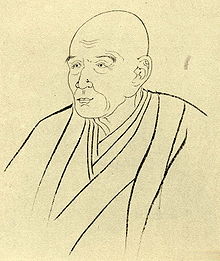Takizawa Bakin | |
|---|---|
 Bakin's portrait by Kunisada (国貞) | |
| Native name | 滝沢 馬琴 |
| Born | Takizawa Okikuni (滝沢興邦) 4 July 1767 Fukagawa, Edo, Japan |
| Died | 1 December 1848 (aged 81) Shinano Hill, Japan |
| Resting place | Jinkōji Temple, Tokyo, Japan |
| Pen name | Kyokutei Bakin (曲亭馬琴) |
| Genre | Gesaku (Yomihon) |
| Notable works |
|
| Spouse |
Aida Ohyaku
(m. 1793; died 1841) |
| Children |
|

Takizawa Bakin (滝沢 馬琴), a.k.a. Kyokutei Bakin (曲亭 馬琴, 4 July 1767 – 1 December 1848), was a Japanese novelist of the Edo period. Born Takizawa Okikuni (滝沢興邦), he wrote under the pen name Kyokutei Bakin (曲亭馬琴). Later in life he took the pen name Toku (解). Modern scholarship generally refers to him as Kyokutei Bakin, or just as Bakin. He is regarded as one of, if not the, leading author of early 19th century Japanese literature.[1] He was the third surviving son of a Samurai family of low rank. After numerous deaths in his family, he relinquished his samurai status, married a merchant's widow, and became an Edo townsperson. He was able to support his family with his prolific writing of gesaku,[2] primarily didactic historical romances, though he always wanted to restore his family to the samurai social class.[3] Some of his best known works are Nansō satomi hakkenden (The Chronicles of the Eight Dog Heroes of the Satomi Clan of Nansō) consisting of 106 books[4] and Chinsetsu yumiharizuki (Strange Tales of the Crescent Moon). Bakin published more than 200 works in his life, including literary critiques, diaries, and historical novels.
- ^ Zolbrod, Leon (1966). "Yomihon: The Appearance of the Historical Novel in Late Eighteenth Century and Early Nineteenth Century Japan". The Journal of Asian Studies. 25 (3): 485–498. doi:10.2307/2052003. ISSN 0021-9118. JSTOR 2052003. S2CID 162540508.
- ^ Ueda, Atsuko (2005). "The Production of Literature and the Effaced Realm of the Political". The Journal of Japanese Studies. 31 (1): 61–88. doi:10.1353/jjs.2005.0029. ISSN 1549-4721. S2CID 144640212.
- ^ Zolbrod, Leon M. (1967). Takizawa Bakin. New York: Twayne Publishers, Inc. LCCN 67-12269. OCLC 625222.
- ^ 滝沢馬琴墓(深光寺) Bunkyō, Tokyo